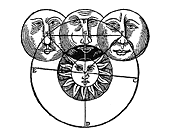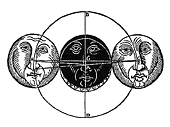|
|
The Sun-Eating Dragon Continued Consider the experience of the writer Annie Dillard, watching a recent total solar eclipse from the hills of Washington state:
"From all
the hills came screams. A piece of sky beside the crescent sun was
detaching. It was a loosened circle of evening sky, suddenly lighted
from the back. It was an abrupt black body out of nowhere; it was
a flat disk; it was almost over the sun. That
is when there were screams. At once this disk of sky slid over the
sun like a lid. The sky snapped over the sun like a lens cover.
The hatch in the brain slammed. Abruptly, it was dark night, on
the land and
And consider the enthusiasm and reverence expressed by J. B. Zirker, a veteran astronomer who has seen countless eclipses, in his account of an eclipse in 1980:
"I pull
off the lens cap. Ray adjusts the pointing of the
Zirker, director of the Sacramento Peak Observatory in Sunspot, New Mexico, understands better than most exactly what's happening during an eclipse, yet he still experiences the event as a momentary contact with the fantastic majesty of the universe. Astrophysicist David Dearborn shares this feeling, "I've seen many eclipses, and each time it is just a marvelous experience, a phenomenal thing to see." As he puts it, eclipses are not interesting to scientists just because of all the phenomena that can be seen and researched, but because, "all of these beautiful and interesting things are happening during the middle of the day, when the sun just should be there!"
What power does
knowledge have over terror? Does knowing how something works diminish
its beauty and mystery? Or is the beauty of the world deepened by
understanding the things we see? As you watch the total solar eclipse
along with us and learn more about eclipses, ask yourself
how your perception of this unique event is affected by the things
you're learning.
|

|

|
 in the sky. In the night sky was a tiny ring of light.
The hole where the sun belongs is very small. A thin ring of light
marked its place. There was no sound. The eyes dried, the arteries
drained, the lungs hushed. There was no world. We were the world's
dead people rotating and orbiting around and around, embedded in
the planet's crust, while the earth rolled down. Our minds were
light-years distant, forgetful of almost everything. Only
an extraordinary act of will could recall us to our former, living
selves and our contexts in matter and time. We had, it seems, loved
the planet and loved our lives, but could no longer remember the
way of them. We got the light wrong. In the sky was something that
should not be there. In the black sky was a ring of light. It was
a thin ring, an old, thin silver wedding band, an old, worn ring.
It was an old wedding band in the sky, or a morsel of bone. There
were stars. It was all over." ("Total Eclipse" in
Teaching a Stone to Talk.
)
in the sky. In the night sky was a tiny ring of light.
The hole where the sun belongs is very small. A thin ring of light
marked its place. There was no sound. The eyes dried, the arteries
drained, the lungs hushed. There was no world. We were the world's
dead people rotating and orbiting around and around, embedded in
the planet's crust, while the earth rolled down. Our minds were
light-years distant, forgetful of almost everything. Only
an extraordinary act of will could recall us to our former, living
selves and our contexts in matter and time. We had, it seems, loved
the planet and loved our lives, but could no longer remember the
way of them. We got the light wrong. In the sky was something that
should not be there. In the black sky was a ring of light. It was
a thin ring, an old, thin silver wedding band, an old, worn ring.
It was an old wedding band in the sky, or a morsel of bone. There
were stars. It was all over." ("Total Eclipse" in
Teaching a Stone to Talk.
)
 telescope a hair
and says "GO!" Our motorized camera begins to whine and
snap regularly, as Horst sets the time for increasingly long exposures.
I look up. Incredible! It is the eye of God. A perfectly black disk,
ringed with bright spiky streamers that stretch out in all directions.
A few red prominences. A star or two. This fantastic object, blazing
in the surrounding blackness, at mid-morning. What a stunning sight!"
telescope a hair
and says "GO!" Our motorized camera begins to whine and
snap regularly, as Horst sets the time for increasingly long exposures.
I look up. Incredible! It is the eye of God. A perfectly black disk,
ringed with bright spiky streamers that stretch out in all directions.
A few red prominences. A star or two. This fantastic object, blazing
in the surrounding blackness, at mid-morning. What a stunning sight!"